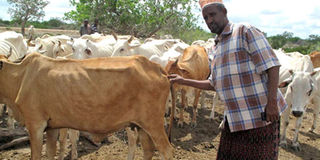Crop farming pays off for pastoralists

Mr Abdikadir Sheikh Hassan, 65, with his 400 cows at his Masalani farm in Ijara, Garissa County, on April 23, 2014. Residents in the drought-prone county have abandoned livestock keeping for crop farming, and the new activity is paying off. FILE PHOTO | JACOB OWITI | NATION MEDIA GROUP
What you need to know:
- With the support of a local NGO, the families ventured into crop farming following the loss of their livestock to drought. A year after doing so, they are making huge profits.
- Mr Hussein said he was left with nothing else to do in his Abaqdera Village before Adeso, an international NGO, offered them technical training on farming.
Residents in the drought-prone county have abandoned livestock keeping for crop farming, and the new activity is paying off.
With the support of a local NGO, the families ventured into crop farming following the loss of their livestock to drought. A year after doing so, they are making huge profits.
Ms Isnino Bile Bare said her family’s fortunes had changed for the better after shifting to crop farming.
She spoke to the Nation at Tawakal Farm in Abaqdera, 90 kilometres from Garissa town.
“I have harvested for the first time since I started this farm in September last year, and made a big profit from selling the produce. We no longer rely on relief food,” she said.
She harvested 17 50-kilogramme sacks of maize and 15 50-kilogramme sacks of chillies.
ADESO
The mother of eight uses water from the River Tana.
Mr Abdullahi Hussein and his wife Rukia Mohamud, who are among the 13 members of Tawakal Farm, said they had 50 cattle and 100 goats, but due to last year’s drought they were left with only two cattle and 30 goats.
Mr Hussein said he was left with nothing else to do in his Abaqdera Village before the African Development Solutions (Adeso), an international NGO, offered them technical training on farming.
“We have realised that depending solely on animals for a livelihood is no longer viable. No wonder we have diversified,” said Mr Hussein.
“My remaining animals can now survive on the fodder and weeds from the farm. I no longer walk long distances in search of pasture and water for my livestock,” he added.





